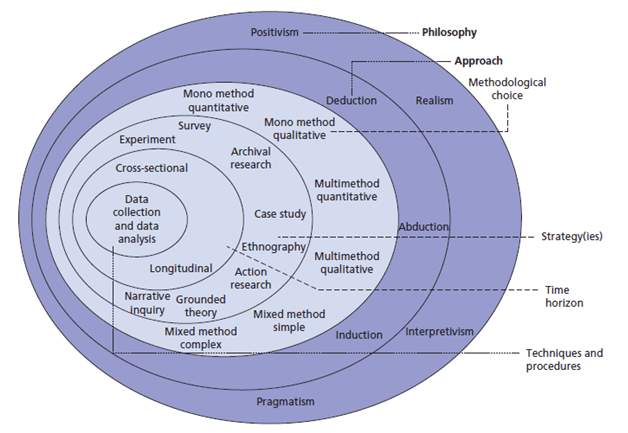Research Philosophy – Research Methodology
Research philosophy is a vast topic and here we will not be discussing this topic in great details. Research philosophy is associated with assumption, knowledge and nature of the study. It deals with the specific way of developing knowledge. This matter needs to be addressed because researchers may have different assumptions about the nature of truth and knowledge and philosophy helps us to understand their assumptions.
In business and economics dissertations at Bachelor’s level, you are not expected to discuss research philosophy in a great level of depth, and about one page in methodology chapter devoted to research philosophy usually suffices. For a business dissertation at Master’s level, on the other hand, you may need to provide more discussion of the philosophy of your study. But even there, about two pages of discussions are usually accepted as sufficient by supervisors.
Discussion of research philosophy in your dissertation should include the following:
- You need to specify the research philosophy of your study. Your research philosophy can be pragmatism, positivism, realism or interpretivism as discussed below in more details.
- The reasons behind philosophical classifications of the study need to be provided.
- You need to discuss the implications of your research philosophy on the research strategy in general and the choice of primary data collection methods in particular.
The Essence of Research Philosophy
Research philosophy deals with the source, nature and development of knowledge[1]. In simple terms, research philosophy is belief about the ways in which data about a phenomenon should be collected, analysed and used.
Although the idea of knowledge creation may appear to be profound, you are engaged in knowledge creation as part of completing your dissertation. You will collect secondary and primary data and engage in data analysis to answer the research question and this answer marks the creation of new knowledge.
In respect to business and economics philosophy has the following important three functions[2]:
- Demystifying: Exposing, criticising and explaining the unsustainable assumptions, inconsistencies and confusions these may contain.
- Informing: Helping researchers to understand where they stand in the wider field of knowledge-producing activities, and helping to make them aware of potentialities they might explore.
- Method-facilitating: Dissecting and better understanding the methods which economists or, more generally, scientists do, or could, use, and thereby to refine the methods on offer and/or to clarify their conditions of usage.
In essence, addressing research philosophy in your dissertation involves being aware and formulating your beliefs and assumptions. As illustrated in figure below, the identification of research philosophy is positioned at the outer layer of the ‘research onion’. Accordingly it is the first topic to be clarified in research methodology chapter of your dissertation.


Research philosophy in the ‘research onion’[2]
Each stage of the research process is based on assumptions about the sources and the nature of knowledge. Research philosophy will reflect the author’s important assumptions and these assumptions serve as base for the research strategy. Generally, research philosophy has many branches related to a wide range of disciplines. Within the scope of business studies in particular there are four main research philosophies:
The Choice of Research Philosophy
The choice of a specific research philosophy is impacted by practical implications. There are important philosophical differences between studies that focus on facts and numbers such as an analysis of the impact of foreign direct investment on the level of GDP growth and qualitative studies such as an analysis of leadership style on employee motivation in organizations.
The choice between positivist and interpretivist research philosophies or between quantitative and qualitative research methods has traditionally represented a major point of debate. However, the latest developments in the practice of conducting studies have increased the popularity of pragmatism and realism philosophies as well.
Moreover, as it is illustrated in table below, there are popular data collection methods associated with each research philosophy.
Pragmatism
Positivism
Realism
Interpretivism
Popular data collection method
Mixed or multiple
method designs,
quantitative and qualitative
Highly structured,
large samples,
measurement, quantitative, but can use qualitative
Methods chosen must fit the subject matter, quantitative or qualitative
Small samples, in-depth
investigations, qualitative
Research philosophies and data collection methods[3]
My e-book, The Ultimate Guide to Writing a Dissertation in Business Studies: a step by step assistance contains discussions of theory and application of research philosophy. The e-book also explains all stages of the research process starting from the selection of the research area to writing personal reflection. Important elements of dissertations such as research philosophy, research approach, research design, methods of data collection and data analysis are explained in this e-book in simple words.
John Dudovskiy


[1] Bajpai, N. (2011) “Business Research Methods” Pearson Education India
[2] Tsung, E.W.K. (2016) “The Philosophy of Management Research” Routledge
[3] Table adapted from Saunders, M., Lewis, P. & Thornhill, A. (2012) “Research Methods for Business Students” 6th edition, Pearson Education Limited















![Toni Kroos là ai? [ sự thật về tiểu sử đầy đủ Toni Kroos ]](https://evbn.org/wp-content/uploads/New-Project-6635-1671934592.jpg)


